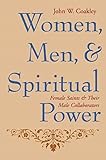Women, Men, and Spiritual Power : Female Saints and Their Male Collaborators / John Coakley.
Material type: TextPublisher: New York, NY : Columbia University Press, [2006]Copyright date: ©2006Description: 1 online resource (368 p.)Content type:
TextPublisher: New York, NY : Columbia University Press, [2006]Copyright date: ©2006Description: 1 online resource (368 p.)Content type: - 9780231134002
- 9780231508612
- 235.2
- BV5083 .C55 2006
- BV5083 .C55 2006
- online - DeGruyter
- Issued also in print.
| Item type | Current library | Call number | URL | Status | Notes | Barcode | |
|---|---|---|---|---|---|---|---|
 eBook
eBook
|
Biblioteca "Angelicum" Pont. Univ. S.Tommaso d'Aquino Nuvola online | online - DeGruyter (Browse shelf(Opens below)) | Online access | Not for loan (Accesso limitato) | Accesso per gli utenti autorizzati / Access for authorized users | (dgr)9780231508612 |
Browsing Biblioteca "Angelicum" Pont. Univ. S.Tommaso d'Aquino shelves, Shelving location: Nuvola online Close shelf browser (Hides shelf browser)

|

|

|

|

|

|

|
||
| online - DeGruyter Research Techniques for Clinical Social Workers / | online - DeGruyter Attachment and Dynamic Practice : An Integrative Guide for Social Workers and Other Clinicians / | online - DeGruyter Moral Geography : Maps, Missionaries, and the American Frontier / | online - DeGruyter Women, Men, and Spiritual Power : Female Saints and Their Male Collaborators / | online - DeGruyter The Shape of Spectatorship : Art, Science, and Early Cinema in Germany / | online - DeGruyter On Sexuality and Power / | online - DeGruyter Marguerite de Navarre (1492–1549) : Mother of the Renaissance / |
Frontmatter -- Contents -- Acknowledgments -- Introduction: "You Draw Us After You" -- Chapter 1. The Powers of Holy Women -- Chapter 2. Revelation and Authority in Ekbert and Elisabeth of Schönau -- Chapter 3. A Shared Endeavor? -- Chapter 4. James of Vitry and the Other World of Mary of Oignies -- Chapter 5. Self and Saint -- Chapter 6. Hagiography and Theology in the Memorial of Angela of Foligno -- Chapter 7. The Limits of Religious Authority -- Chapter 8. Hagiography in Process -- Chapter 9. Managing Holiness -- Chapter 10. Revelation and Authority Revisited -- Chapter 11. Authority and Female Sanctity -- Notes -- Abbreviations -- Bibliography -- Index
restricted access online access with authorization star
http://purl.org/coar/access_right/c_16ec
In Women, Men, and Spiritual Power, John Coakley explores male-authored narratives of the lives of Catherine of Siena, Hildegard of Bingen, Angela of Foligno, and six other female prophets or mystics of the late Middle Ages. His readings reveal the complex personal and literary relationships between these women and the clerics who wrote about them. Coakley's work also undermines simplistic characterizations of male control over women, offering an important contribution to medieval religious history.Coakley shows that these male-female relationships were marked by a fundamental tension between power and fascination: the priests and monks were supposed to hold authority over the women entrusted to their care, but they often switched roles, as the men became captivated with the women's spiritual gifts. In narratives of such women, the male authors reflect directly on the relationship between the women's powers and their own. Coakley argues that they viewed these relationships as gendered partnerships that brought together female mystical power and male ecclesiastical authority without placing one above the other. Women, Men, and Spiritual Power chronicles a wide-ranging experiment in the balance of formal and informal powers, in which it was assumed to be thoroughly imaginable for both sorts of authority, in their distinctly gendered terms, to coexist and build on each other. The men's writings reflect an extended moment in western Christianity when clerics had enough confidence in their authority to actually question its limits. After about 1400, however, clerics underwent a crisis of confidence, and such a questioning of institutional power was no longer considered safe. Instead of seeing women as partners, their revelatory powers began to be viewed as evidence of witchcraft.
Issued also in print.
Mode of access: Internet via World Wide Web.
In English.
Description based on online resource; title from PDF title page (publisher's Web site, viewed 02. Mrz 2022)


